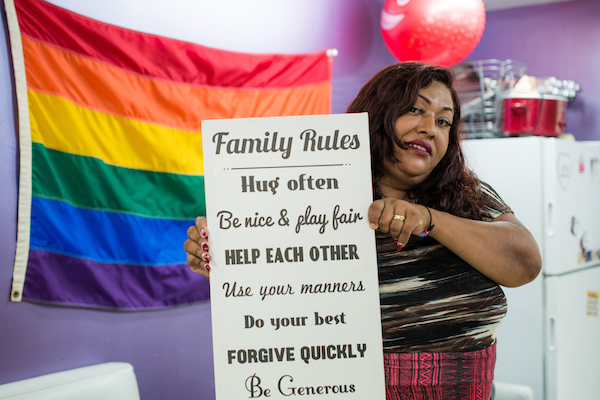In July 2023, Casa Ruby, a non-profit organization and community center in Washington, D.C. that provided housing, food, and other social services to primarily transgender and gender queer people, shut down its operations due to lack of (and missing) funds. Later, reports would come out that the organization’s employees were not being paid, and its founder Ruby Corado was mishandling funds. Ultimately, resulting in the city canceling an $800K contract with the organization.
As of today, there is an open case against Corado, as well as the Casa Ruby board of directors alleging violations to the city’s Nonprofit Corporations Act and embezzlement, among other things.
Meeting Ruby
When I first met Ruby Corado at a John Hopkins University fundraising conference in 2014, I was eager to learn more about this fascinating woman from El Salvador who had created such a haven for Black and Brown, queer and trans youth and young adults to escape violence and work to get their lives back on track. She invited me to Washington, D.C. for dinner, so I hopped in her car, and we drove down.
Trans Women of Color Collective (TWOCC) was working to expand our National Headquarters to D.C. but didn’t have any connections. Ruby was generous and gracious enough to house us at Casa Ruby, providing us much needed office space and access to resources. She let me sleep on her couch and took me to look at apartments until I got settled. When I found an apartment, she wrote me a new hire letter so that I could secure it and we were off to a delightful professional and personal relationship.
She introduced me to the community and invited me into rooms I had never been in. She took me to where the bodies of our ancestors were found brutally mangled, shot, slain, and murdered in cold blood. Some in broad daylight. When I found an apartment, she hired me to be on her team. We even shared office space downtown on K Street and we began to develop a sisterhood that I’d never experienced.
Who was this Brown trans woman who so eagerly and willingly understood the need for us to support our own, to have our own and to govern what we said we needed from funders and those who considered themselves aligned with our mission and vision that Black and Brown trans women deserve? This was Ruby Corado. There was also another side of Ruby. One that many Black and Brown queer and trans leaders find themselves at the crossroads of.
TWOCC functioned from donations and my speaking engagements so in 2015 when we were awarded a $25,000 grant from Elton John AIDS Foundation (EJAF), Casa Ruby became TWOCC’s fiscal sponsor so that we could receive those funds. Unfortunately, we never received the full grant, in fact Casa Ruby spent $15,000 of that money as they saw fit. Even though our written contract was breached, EJAF attempted to force TWOCC to continue our partnership with Casa Ruby. We stood our ground and searched for a new fiscal sponsor while EJAF re-dispersed the funds and acted as if nothing happened.
Non-profits and Lessons Learned
Let’s be clear, the nonprofit industrial complex is inextricably linked to white supremacy, capitalism, imperialism, and colonialism. To say this wheel of oppression does not exist would be foolish and would undermine everything we have seen develop out of the demise of many nonprofit organizations. In particularly, those led by trans, queer people of color.
As someone who has worked at non-profit organizations since 1993, I’ve noticed a nuanced observation that really centers on the disproportionate lack of allocated government and foundational funding, resources, professional development, and capacity building tools provided to trans, queer, Black and Brown led non-profits, rooted in facts but also in accountability, culpability as none of us are beyond reproach.
The point is that we should always interrogate any system designed by the government to help the people. In this situation, accountability and culpability goes beyond Corado, Casa Ruby’s board, the government funders and those who turned a blind eye when they witnessed first-hand the violence clients were facing and the corruption behind closed doors.
We are all responsible for the future of those disproportionately targeted by state sanctioned violence. We are all responsible for not only Casa Ruby’s demise but what has happened to its staff, clients, and the community. My hope is that we all can heal from trauma, live our best lives and do better to provide, nurture and protect our young people.


